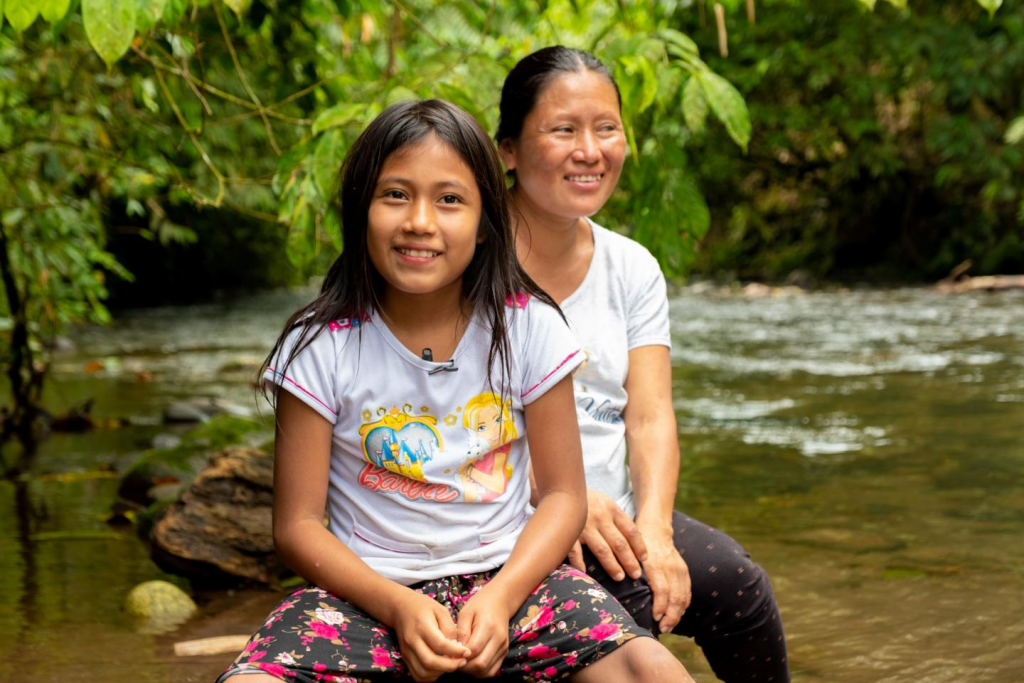Curated by the Knowledge Team of ICS Career GPS
Education

In the Ecuadorian Amazon, remote doesn’t mean cut off
Excerpts from article by Ana María Castro, published in UNICEF
PANDAYACU, Ecuador – Raiza is starting her morning the way she usually does. After waking up at 6 a.m. she heads to the family dining room where her mother, Silvia, has prepared breakfast: chucula, a sweet plantain smoothie that’s popular in the Ecuadorian Amazon.
After breakfast, Raiza, 11, helps her mother with the dishes before feeding the family pets and collecting cassava and other fruits and vegetables from their garden in Pandayacu, a Kichwa indigenous community in northeastern Ecuador. Silvia is pregnant and expected to give birth in the next few days, so she’s more tired than usual and needs a little extra help around the house.
But the imminent arrival of a new sibling isn’t the only change Raiza has been grappling with. For the past few months, she hasn’t been able to go to school.
“Don’t forget to wash your hands with soap and water when you’re done,” Silvia reminds Raiza as her daughter leaves the house. It’s a familiar phrase heard around the world these days, and a reminder that even in remote communities such as Pandayacu, COVID-19 is upending young people’s lives.
Bridging the education gap
Three months have passed since school closures across Latin America and the Caribbean left some 154 million children temporarily out of class. But while many children have been able to continue learning remotely, in more isolated areas like the Ecuadorian Amazon, online learning isn’t an option.
With no internet access, no cell phone and no television in her home, Raiza has been relying on weekly visits from her teacher, Doris.
The COVID-19 pandemic has underscored the already significant difference in access to education between those living in urban areas and those living in rural parts of Ecuador. Almost two thirds of the country’s households lack internet connectivity, leaving many children – especially those outside of towns and cities – unable to take advantage of remote learning tools.
That’s where teachers like Doris come in. Utilizing materials that cover traditional subjects – such as mathematics, history, Spanish, family-based activities like cooking and crafts, and new guidance on preventing the spread of COVID-19 – teachers who would usually travel to a classroom are visiting students’ homes, checking on their progress and setting homework.
The education materials being shared build on a programme that was first developed as part of the response to the devastating earthquake in 2016, which left many children at risk of falling behind due to their school being closed. These materials have been adapted with the support of UNICEF and implementing partner Desarrollo y Autogestión to assist around 1,200 children, like Raiza, considered to be at similar risk of falling behind their peers due to the COVID-19 school closures.
“Many of [these children] are in vulnerable situations and are impacted by migration, domestic violence, child labour or sometimes cultural beliefs that don’t promote the education of children, particularly girls,” says Nancy Torres, coordinator of the Pedagogical Levelling and Acceleration project at Desarrollo y Autogestión.
“I know children can’t go to school right now, but they are still learning at home with help from their parents,” Silvia says. “And they’re still able to play in the river and enjoy our beautiful nature.”
Career

The New Way To Create A Fulfilling Career Path
Excerpts from article by Lisa Lewis, published in Forbes
The paradox of learning junkies is that we never stop wanting to be challenged, so the craving to expand doesn’t just go away when you get that great job. Learning junkies actually outgrow jobs faster than your average bear, and end up looking for new possibilities to keep expanding their knowledge.
After watching the growth and expansion cycle for several years, here’s the trend seen among learning-oriented individuals: You start out and discover a direction that sparks joy and excitement in your soul. You land the job (or start the business). You are flying high, often for months or years
At some point, enough time has passed that some of the luster of the initially thrilling job wears off. Maybe some of the excitement dwindles as you settle in, or maybe a teammate’s behavior starts to get on your nerves a little bit. There’s an opportunity at this point to make minor adjustments to course-correct, perhaps by talking to your boss about the annoying coworker or starting a daily gratitude practice at the office.
You might outgrow your work and master the job, or perhaps realize that you don’t want to stay on that team forever. You’ll be evolving and changing as time goes on, and so will your values and needs. Almost inevitably, you’ll find that your work doesn’t match up quite as well with your values and needs anymore.
Sometimes it’s because the work changes: they’re asking you to work longer hours, violating your lifestyle needs, or your promotion ends up pushing you away from your strengths. Other times, it’s because you’re stagnating or feeling “bored out” and burnt out. No matter the cause, there will come a moment when you realize you current role is no longer serving you.
If you know someone who’s constantly complaining about their job, is not fun to be around, and yet won’t do anything to solve the problem, you know exactly what it looks like to stay at a poor-fit job too long.
If you make the decision to do something about it, you’ll move into a delightful and juicy introspective season where you reestablish who you are and what you want by doing lots of reflection. It’s time to envision what you want most and imagine a reprioritization of your life to better honor your current priorities and values. From here, you grow right into your next career evolution.
Seeing this growth cycle might be a relief or even a joy. It’s truly the natural order of things, and anything else would be fighting your humanness. Don’t beat yourself up about the speed with which you notice yourself moving through this progression. There’s natural variation with every learning junkie.
Many people wish there was a magical “silver bullet” for knowing exactly what to do next, so you can check the boxes, slide into your new career path, and kick up your feet until you retire. Unfortunately, there’s not one. But once you start taking steps in the direction you think fulfillment might lie, you’ll notice what feels good and can keep moving toward that.
When you pair this approach with self-awareness, you’ll have the skill-set to powerfully and confidently make move after move throughout the years. You deserve to do work that helps you become your most alive, energized, joyful self.
(Disclaimer: The opinions expressed in the article mentioned above are those of the author(s). They do not purport to reflect the opinions or views of ICS Career GPS or its staff.)
Like this post? For more such helpful articles, click on the button below and subscribe FREE to our blog.




